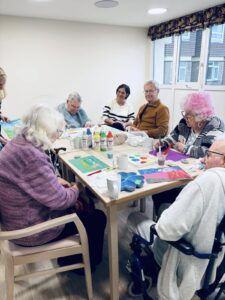Imagine memory care as the gentle hands that navigate the labyrinth of time for the elderly, guiding them through the corridors of their past. At the core of aging gracefully lies the significance of memory care in preserving identity and fostering well-being.
As you ponder the essence of quality life for seniors, consider how memory care plays a pivotal role in not just maintaining but enhancing their sense of self and connection to the world around them.
Ease into this exploration of why memory care is a vital component in the pursuit of a fulfilling and dignified elderly life.
Key Takeaways
- Memory care enhances well-being by reducing confusion and agitation, promoting social interactions, and ensuring proper nutrition and exercise.
- Tailored support services cater to individual needs, offering personalized care plans, assistance with daily activities, and 24/7 compassionate support.
- Memory care promotes independence and dignity through empowering choices, tailored care plans, social interactions, and honoring past experiences.
- Strategies for health and happiness in memory care include physical activity, social interaction, nutritious meals, and tailored group activities.
Impact of Memory Care on Well-being
When providing memory care for the elderly, the impact on their well-being is profound and essential for maintaining their quality of life. Memory care services play a crucial role in enhancing the overall well-being of individuals with cognitive impairments. By creating a safe and supportive environment, caregivers can help reduce feelings of confusion and agitation that often accompany memory loss.
Engaging seniors in meaningful activities tailored to their interests and abilities can positively influence their emotional and mental health. Social interactions, cognitive exercises, and reminiscence therapy not only stimulate their minds but also foster a sense of belonging and purpose. These activities can boost self-esteem, reduce anxiety, and improve overall mood.
Additionally, memory care focuses on promoting physical health through proper nutrition, medication management, and regular exercise. A holistic approach that addresses the mind, body, and soul can significantly impact the well-being of elderly individuals with memory issues. By providing compassionate and personalized care, caregivers can enhance the quality of life for seniors in memory care programs.
Tailored Support Services Offered
Tailored support services offered in memory care facilities are designed to meet the unique needs and preferences of each individual resident, ensuring personalized and effective care. These services encompass a range of specialized assistance, including personalized care plans, medication management, and engaging activities tailored to the resident’s cognitive abilities and interests. By customizing care to suit each individual, memory care facilities can provide a supportive and nurturing environment that promotes overall well-being.
In addition to personalized care plans, memory care facilities offer assistance with daily activities such as bathing, dressing, and meals. Trained staff members are available around the clock to provide compassionate support and ensure the safety and comfort of residents. Furthermore, these facilities often provide socialization opportunities and cognitive stimulation exercises to help residents maintain mental acuity and social connections.
Promoting Independence and Dignity
To promote independence and dignity in memory care for the elderly, it’s essential to foster a sense of autonomy and respect for each resident’s individual preferences and abilities. This approach helps create a supportive environment where residents can maintain their sense of self-worth and identity despite memory challenges. Here are some key strategies to achieve this:
- Encourage decision-making: Empower residents to make choices about their daily routines and activities whenever possible. This not only promotes independence but also helps maintain cognitive function and self-esteem.
- Provide personalized care: Tailoring care plans to align with each individual’s unique needs and preferences is crucial for upholding dignity. Recognizing and honoring their past experiences and interests can go a long way in fostering a sense of identity and purpose.
- Offer opportunities for social engagement: Facilitating social interactions and meaningful connections with peers, family members, and caregivers can help combat feelings of isolation and promote a sense of belonging and community.
Enhancing Quality of Life Factors
Enhancing the quality of life for elderly individuals in memory care involves implementing tailored activities and programs that cater to their specific needs and interests. These activities are designed to stimulate the mind, evoke positive emotions, and create a sense of purpose and fulfillment in their daily lives. By participating in activities such as art therapy, music sessions, reminiscence therapy, and physical exercises, elderly individuals can experience a boost in mood, cognitive function, and overall well-being.
Engaging in social interactions is another crucial aspect of enhancing quality of life for seniors in memory care. Building connections with peers, caregivers, and volunteers can help combat feelings of loneliness and isolation, fostering a sense of belonging and community. Meaningful conversations, shared experiences, and group outings can all contribute to a more fulfilling and enriching life for the elderly residents.
Furthermore, providing opportunities for sensory stimulation through nature walks, aromatherapy, and sensory-rich environments can evoke pleasant memories, reduce stress, and enhance the overall sensory experience for individuals with memory impairments. These tailored approaches to enhancing quality of life factors can significantly improve the well-being and happiness of elderly individuals in memory care settings.
Strategies for Health and Happiness
To ensure the well-being and contentment of elderly individuals in memory care, focusing on tailored strategies for health and happiness is paramount. Here are some compassionate and effective ways to promote their overall well-being:
- Encourage Physical Activity: Engaging in gentle exercises like walking, stretching, or chair yoga can boost mood, improve circulation, and enhance mobility.
- Promote Social Interaction: Facilitate group activities, such as art classes, music sessions, or storytelling circles, to foster connections, reduce feelings of isolation, and stimulate cognitive functions.
- Provide Nutritious Meals: Offer well-balanced and appealing food options that cater to their dietary needs and preferences, ensuring they receive essential nutrients for optimal health and energy levels.
Frequently Asked Questions
How Does Memory Care Specifically Address the Emotional Needs of Elderly Individuals With Cognitive Impairments?
In memory care, you’re supported with personalized activities, familiar faces, and a safe environment. This helps address your emotional needs by fostering connections, reducing anxiety, and promoting a sense of security and belonging.
Are There Any Specific Activities or Therapies Offered in Memory Care That Cater to Individual Preferences and Interests?
In memory care, various personalized activities and therapies are available to meet your individual preferences and interests. These programs aim to enhance your quality of life, promote engagement, and provide a sense of fulfillment and joy.
How Does Memory Care Ensure the Safety and Security of Residents While Promoting Independence?
In memory care, safety and security are paramount. Staff ensures your well-being by implementing secure environments, monitoring systems, and personalized care plans. Independence is promoted through tailored activities and support, creating a nurturing and empowering atmosphere.
What Measures Are Taken to Maintain a Sense of Dignity and Respect for Elderly Individuals Receiving This Care?
In memory care, every effort is made to preserve your dignity and respect. Staff provide personalized care, honor your preferences, and create a nurturing environment. Did you know that 80% of memory care residents report feeling respected and valued?
How Does Memory Care Address the Social and Spiritual Needs of Residents in Addition to Their Physical and Cognitive Well-Being?
In memory care, social connections and spiritual support are integrated with physical and cognitive care to enhance residents’ well-being. You’ll find comfort, companionship, and opportunities for meaningful interactions that nurture your whole self.
Conclusion
In conclusion, memory care plays a crucial role in enhancing the quality of life for the elderly by providing tailored support services, promoting independence, and maintaining dignity.
By focusing on well-being and happiness, memory care facilities create a nurturing environment that fosters health and joy.
Embracing the unique needs of individuals with memory issues allows for a more fulfilling and enriched experience in their later years.
Remember, caring for memory is caring for life.






